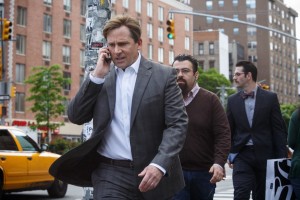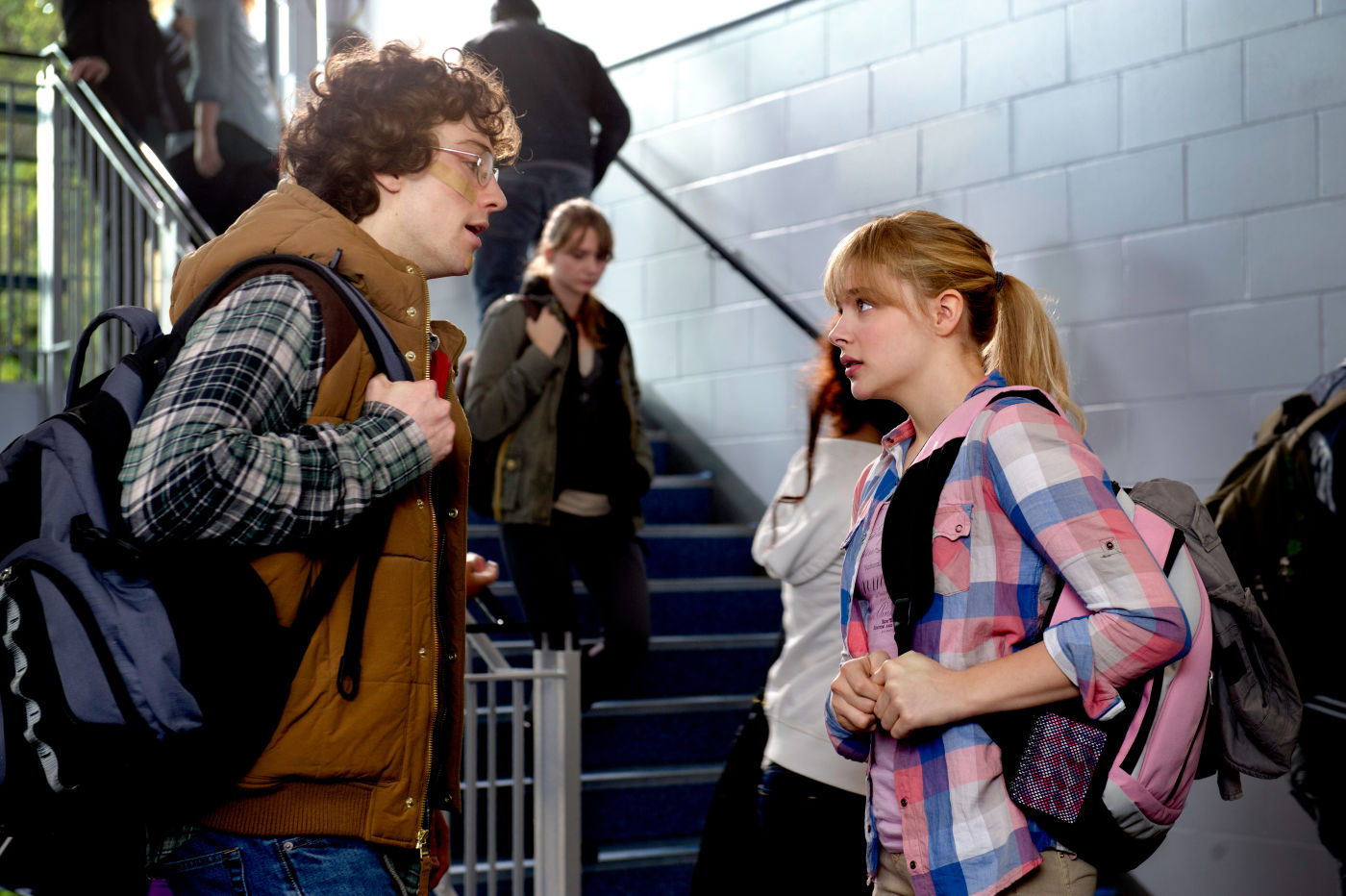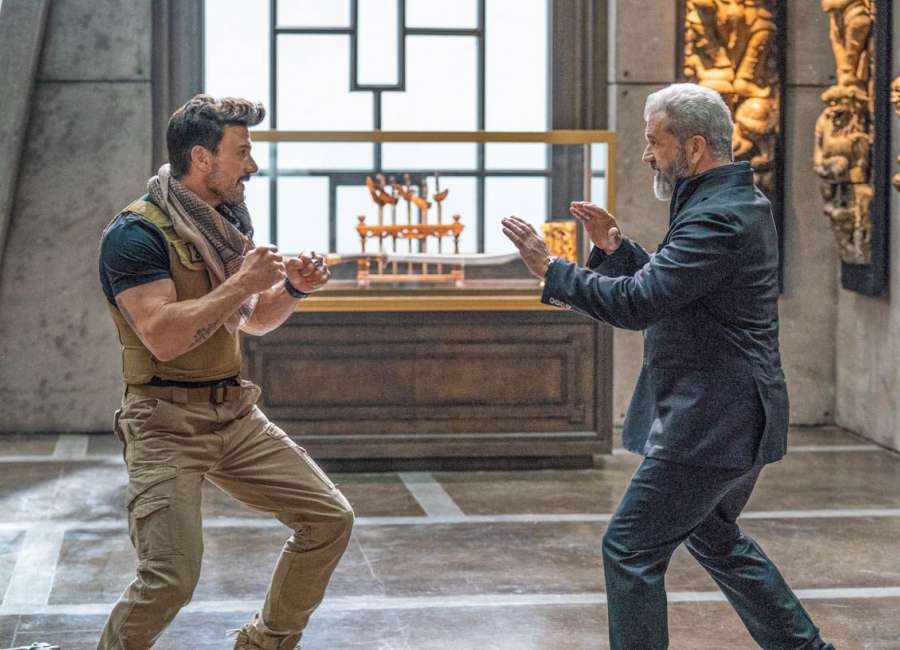I’ve been waiting for this film. Ever since I became one of the eight million (8,000,000!) Americans who lost a job because of the economic train wreck at the tail end of the W. presidency, I have been waiting for the Oscar worthy film that told exactly what happened, how and why it happened without condescending or talking over my head … and without putting me to sleep. You want to call The Big Short the best film of 2015? Guess what? I do, too.
The economic meltdown of 2007 didn’t drag everybody to Debtor’s Hell – some made out quite well, in fact. The Big Short is their story. The movie identifies four groups of playahs, each led by somebody you expect to have a bigger role: our narrator Jared Vennett (Ryan Gosling), Dr. Michael Burry (Christian Bale), Mark Baum (Steve Carell) and Bern Rickert (Brad Pitt). Pitt has just a tiny role; he’s little more than mentor to a couple of talented babies — Charlie Geller (John Magaro) and Jamie Shipley (Finn Wittrock). Bale and Carell, both excellent, seem to be having a contest over who can steal focus more definitively. Dr. Burry is portrayed as a man who cavorts shoeless in his office while sporting drumsticks and blasting death metal, then staring into space as if the answers are written in clouds only for him to see. Baum is simply the guy who can’t not tell you you’re wrong and why; he has almost no filter and I suspect he’s based on a spectrum dweller, too.
I wonder if the real-life Baum is upset about this – “hey, man, we’re both kinda the same guy – a social leper genius who spotted danger years before it happened … why does he get to be Batman while I’m Michael from “The Office?” What’s up with that?”
The genius of The Big Short is the having fun with topics that bore you silly. We get an inside look into how the Wall Street game is played – Shipley and Geller find an inspirational doomsday prospectus after being embarrassed as small-timers in the lobby of a huge financial firm, but the narration is quick to tell us that isn’t actually what happened; we just like that fiction. Better is when Baum interrupts a keynote speaker at the Vegas mortgage banking convention just to tell him he’s full of shit. When he takes a phone call and ducks out mid-embarrassment, the camera finds Vennett who speaks directly to us, “he really did that. Now do you see what I’m dealing with?”
It’s the tongue-in-cheek that electrifies Big Short – yeah, I was in the profession for decades and I can’t stand hearing about mortgage banking any more than you can. My eyes will start to glaze over, and just when you think the movie is headed in that dead-end direction, it gives us something like, “here’s Margot Robbie in a bubble bath to explain subprime mortgages.” If you learn nothing else from The Big Short, know that subprime = shit. Margot Robbie said so.
subprime = shit. Margot Robbie said so.
So what did happen? Long story short – banks got greedy and started using less and less valuable assets to back “solid” investments. This was exacerbated when banks deliberately gave loans to higher risk applicants without scrutiny. The mechanisms that should have been in place preventing such were not because everybody was making money. Fraud existed at every level of this pyramid. A handful saw this coming. This is the thing that always got me about the crisis – how do you make money off tanking mortgages? It’s not like going to the OTB counter and betting against the Mets. There aren’t odds posted that your out-of-work neighbor Wally won’t get his monthly payment in on time. And the answer, actually, is quite simple: if you have enough money, you can bet on anything. Oh. I get it now. And here’s the bigger problem – the exact people willing to take those bets are also the people who stood to lose big when they paid off. First rule of any investment is know how you’re getting paid if you win. Maybe not the first rule — but certainly top five.
The Big Short didn’t lack for targets, but most came in organization, not individual, form: Bear Stearns, Goldman Sachs, Morgan Stanley, Standard & Poors, the SEC … few villains were specifically named besides Alan Greenspan. It’s about damn time Greenspan took some much needed heat for being a corporate tool when the country, the world, needed anything but. You know what’s missing here, however? Congress – the people who make (or in this case rescinded) the laws thus allowing greed to fester unchecked. This is important – over the next year, there will be a number of presidential candidates espousing “free market” or some form of “unbridled / unshackled / untethered / unresponsive capitalism.” These phrases will almost certainly come from someone who has the Herculean task of selling the American public on the mythical benefits of trickle-down economics. Just know that no matter how tempting those magical words “free market” are, the mouth saying them 1) doesn’t understand how the economy collapsed 2) can’t wait to do it again and 3) is firmly in the back pocket of the ultra rich.
♪Well, you went downtown looking for some big ol’ green
With this insight nobody knows
You had the prospectus in your hand
And no socks on your toes
When you wake up in the morning
And you think you’re fired
Cause the Board just can’t seem to see
Go on and bang on your drum set
But don’t wait for much sympathy
Because you had to pull The Big Short, didn’t you?
You had to open up your Mac
You had to pull The Big Short, didn’t you?
Guess what? No one has your back.
You had to make the right move, Wall Street
Treating all those suits like clowns
You had to gamble.rinse.repeat
You have to wait years for those frowns♫
Rated R, 130 Minutes
D: Adam McKay
W: Charles Randolph & Adam McKay
Genre: Spotlighting salmon
Type of person most likely to enjoy this film: Occupy Wall Street
Type of person least likely to enjoy this film: Alan Greenspan
♪ Parody inspired by “Big Shot”



